Civil Liberties, Criminalizing Dissent, FBI Intrusion, Habeas Corpus, Human Rights, Military Tribunal, Political Prisoner, Supreme Court, Torture, War Resister
Podcast: Play in new window | Download
Updates:
- Bradley Manning Public Access Case: Amicus Brief Filed by Reporters’ Committee for Freedom of the Press
- Southern Poverty Law Center Lawsuit Against Chemically Spraying Students
———
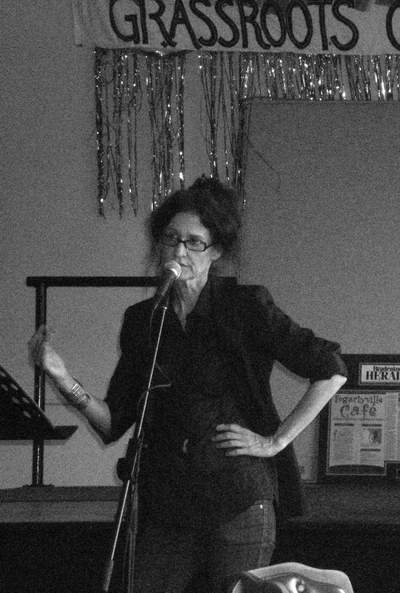
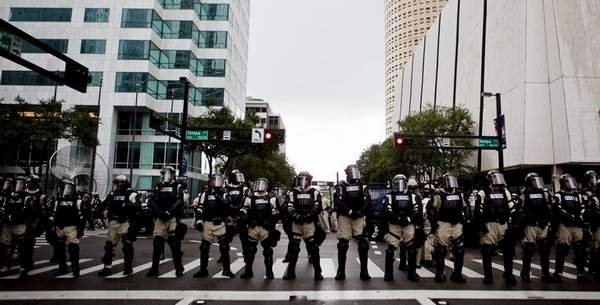
Attorney Heidi Boghosian Speech: National Special Security Events – RNC / DNC
We hear a presentation by our own Heidi Boghosian. Heidi spoke at an event sponsored by station affiliate WSLR FM 96.5 – Sarasota, Florida. As the executive director of the National Lawyers Guild, Heidi had coordinated and organized legal observers during the Republican National Convention in Tampa and the Democratic National Convention in Charlotte. While in Florida, Heidi delivered a talk about the eroding civil rights of protesters during National Special Security events, pre-event surveillance and tactical strategies deployed by police.
Heidi Boghosian is the executive director of the National Lawyers Guild, a progressive bar association established in 1937. She has published articles on policing, protest and the First Amendment including Punishing Protest and The Assault on Free Speech, Public Assembly, and Dissent (North River Press, 2004). Her book reviews have been published in The Federal Lawyer magazine and the New York Law Journal.
———
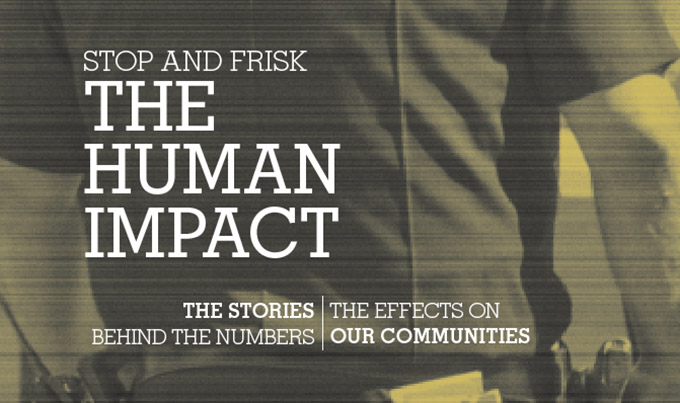

CCR Stop and Frisk Suit NYC: Floyd et al. v. New York City
Last month, a federal judge excluded portions of proposed testimony from New York City’s key witness in the Center for Constitutional Right’s Stop and Frisk class action lawsuit Floyd v. City of New York. Judge Shira A. Scheindlin of the U.S. District Court for the Southern District of New York ruled the defendants’ testimony untested and unreliable. The ruling supports that there isn’t evidence that the “Stop and Frisk” practice reduces crime.” said CCR Legal Director Vince Warren (quote) “The ruling soundly rejects the false choice propounded by the NYPD, between living in a safe city and being free of unconstitutional, racially discriminatory policing.”
In 2009 New York City, a record 576,394 people were stopped, 84 percent of whom were Black and Latino residents — although they comprise only about 26 percent and 27 percent of New York City’s total population respectively. Ten years of raw data obtained by court order from the New York City Police Department (NYPD) showed that stop-and-frisks result in a minimal yield of weapons and contraband.
Attorney Darius Charney:
- When we say “stop” were really talking about a detention of somebody’s liberty by the police. Frisk is a pat down of the outside of somebody’s clothing.
- For purposes of the 4th Amendment we are talking about a seizure when somebody is stopped, their liberty is taken away from them for a period of time and when they’re frisked, they’re searched.
- About 99.3 percent of the time the police find no gun.
- According the Supreme Court in a case they decided about 44 years ago, called Terry v. Ohio, for a police officer to stop someone on the street they have to have what’s called reasonable, articulatable suspicion.
- It has to be more than a hunch, or a whim or a subjective belief that somebody’s doing something wrong. It has to be articulatable specific facts that the officer is aware of that would cause him or her to reasonably believe that this person has committed a crime, is in the process of committing a crime or is about to commit a crime.
- If they have reasonable suspicion and they stop to ask you questions, you’re supposed to answer the questions.
- They may ask you for identification, that’s not against the law in New York state. You don’t have to provide it to them.
- You’re free to not answer but depending on what the questions are and if you don’t answer them, that may give the officer a basis to have probable cause to arrest you.
- For the officer to then put their hands on you, they have to have reasonable suspicion that you’re armed and dangerous.
- It can’t be that they think you have drugs in your pocket. Officers often get angry or irritated if you assert the rights that you have.
- What commonly happens in New York and other places is that somebody does assert their rights the officer may retaliate against them by issuing them a ticket for disorderly conduct.
- The person has a right to say “show me your badge” to a plain clothes police officer.
- Stop and Frisk has increased over 600 percent in New York City.
- In New York police are arresting 50 thousand people a year with small amounts of marijuana.
- The New York Police Department Stop and Frisk practices are literally going to be put on trial in a federal court in Manhattan this coming Spring.
- We were certified for a class action in May, so we have a website for class members. Stopandfrisk
- In order to fight crime you need to work together with the community and if the community doesn’t trust you, fear you, that’s not going to happen.
Guest – Attorney Darius Charney, senior staff attorney in the Racial Justice/Government Misconduct Docket. He is currently lead counsel on Floyd v. City of New York, a federal civil rights class action lawsuit challenging the New York Police Department’s unconstitutional and racially discriminatory stop-and-frisk practices, and Vulcan Society Inc. v. the City of New York, a Title VII class action lawsuit on behalf of African-American applicants to the New York City Fire Department which challenges the racially discriminatory hiring practices of the FDNY.
—————————-
Afghanistan War, CIA Sponsored Terror, Civil Liberties, Criminalizing Dissent, Extraordinary Rendition, FBI Intrusion, Guantanamo, Habeas Corpus, Human Rights, Iraq War, Military Tribunal, Political Prisoner, Targeting Muslims, Torture
Podcast: Play in new window | Download
Updates
- Michael Ratner: Update on Verdict – Corrie v State of Israel
- Cardinal Dolan Who Approved Payoffs For Priests Accused of Sex Abuse To Leave Priesthood Gives Speech At RNC and Closing Speech for DNC
—–

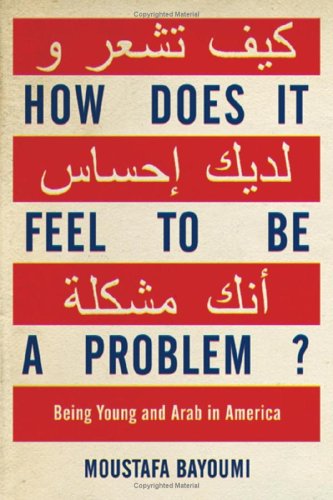

Islamophobia: Anatomy of an American Panic
In the last few weeks, 8 places of worship connected with South Asians or Middle Easterners have been targets in the United States. As many listeners know, six people were murdered at a Sikh temple in Oak Creek, Wisconsin but later that evening a mosque in Joplin Missouri was burned down. Other targets recently included mosques in Rhode Island, Southern California, Oklahoma City and Dearborn, Michigan. These tragic events mark another wave of existential Muslim threats inciting fear and violence against Middle Eastern people while helping to justify the ongoing war on terror.
According to the University of Maryland’s National Consortium for the Study of Terrorism and Response to Terrorism, since 9/11 to 2010 there have been 155 terror incidents in the U.S., and exactly two of them or 1.3 percent have been attributed to international Islamist terror groups. The majority of events involved individuals such as anti-abortionists, right-wing extremists, or extreme animal rights activists.
The Nation Magazine has highlighted the disproportional focus put on Muslim communities in a special issue titled “Islamophobia: Anatomy of an American Panic.” We talk with journalist Lizzy Ratner and authors Deepa Kumar and Moustafa Bayoumi who contributed articles to the Nation Magazine special.
Lizzy Ratner:
- The Nation did a special issue about Islamophobia. It came out in the beginning of July. You can still find the majority of the articles online. The real credit has to go to Abdeen Jabara whose idea this really was.
- The civil rights attorney came to me last year and said the anti-Arab, anti-Muslim has reached fever-pitch.
- So I began to do some research about what exactly was going on and very quickly compiled a massive roster of possible articles.
- For the most part, the Left and Progressives have been far too quiet.
- This bigotry that is flourishing right now has a real history, it’s not a just a product of 9/11 and the post 9/11 era.
- Some of the seeds of bigotry have to do with the role of the United States historically in the Middle East.
- Islamophobia served an agenda and a number of purposes.
Guest – New York City journalist Lizzy Ratner has written extensively for the Nation and Alternet on issues involving Islamophobia. Lizzy is also co-editor of The Goldstone Report: The Legacy of the Landmark Investigation of the Gaza Conflict.
——
Moustafa Bayoumi:
- I was happy to see that the Nation was happy to take on the question of Islamophobia for a double issue.
- There’s been a shift in the last ten years from paranoia around security to a paranoia about the basic facts of Muslim life in the United States.
- In a way you can say it’s a shift from security to culture.
- At any stage, anything that has to do with a daily concerns about living a life as a Muslim American, somehow now becomes charged with sedition. Part of the funding of the anti-Muslim movement in the United States is basic conservative politics and extreme conservative politics.
- And also due to the Israel-Palestine conflict. So people who want to come aboard Israel will make a very distorted picture of what Muslim life is like.
- The NYPD has now a decade long history of “othering” the Muslim-American community.
- The NYPD had been screening The New Jihad for its new recruits.
- It’s a crazy film saying that all of the American Muslims are here as a fifth column ready to pounce. It’s a training film for new recruits. That’s true for the Pentagon and the FBI.
- Muslim Americans are still seen as perpetual foreigners.
- That Muslim American rights are different than everyone else’s rights.
- You’re average American consumer of media does not relate to the victims of the Oak Creek massacre because they don’t see them as being part of the American family.
- They asked American’s in this poll, and 62 percent of the population has never met a Muslim.
- If you’ve never met a Muslim then it’s very easy to believe all these boogey man ideas. That’s why media plays an important role in this issue.
- The FBI (training manual) said that it was in the nature of Muslims to try to take over this country.
Guest – Author Moustafa Bayoumi wrote Fear and Loathing of Islam joins us, his book : Being Young and Arab in America, won an American Book Award and the Arab American Book Award for non-fiction. He is also a professor of English at Brooklyn College, City University of New York.
——
Deepa Kumar:
- As of late the anti-Muslim statements coming from Michelle Bachmann, Joe Walsh, all of whom are Republicans, there is a sense of which it is the Republicans who are responsible for Islamophobia, for the demonization of Muslims and so on.
- This brand of the war on terror gets hatched and part of that was language developed in the 1990s, called the Clash of Civilizations. It was a man named Bernard Lewis who first penned this term.
- It’s not so much we’re going to carry out revenge on Osama Bin Laden but that we’re going to rescue Afghan women. In the case of Iraq, we’re going to bring democracy when no weapons of mass destruction were found.
- This rhetoric has a long history it goes back to the 19th century.
- Both presidents need Islamophobia. They need to generate this fear and hatred of the “Muslim other.”
- Operation Boulder
- The Jonathan Institute holds this conference in Jerusalem . . Islamofacism, the roots are sown at that conference.
- The idea of this menacing Muslim enemy is not new. It was not something created after 9/11 but in fact it goes back a millennium.
- It’s about political goals but religious rhetoric gets used. Same thing with the re-conquest of Spain.
- The Islamophobic rhetoric is one that’s mobilized by the elite.
- I hold both Republicans and Democrats responsible. These rabid right wingers get their confidence from mainstream figures like Walsh, like Bachmann and others.
- The sad reality is that the Democrats have done nothing to counter this.
- The Democrats are not an ally in this fight.
- I take inspiration from 2 movements in the sixties, the civil rights movement and the anti-war movement. I think these 2 strategies need to come together in fighting Islamophobia.
- We have to take on both the far right and challenge the priorities of empire and bring together a multiracial coalition that can actually change a generation.
- It was President Clinton with Anti-Terrorism and Effective Death Penalty Act in 1996 which made it legal to actually deport people with secret evidence. We know this lays the basis for the Patriot Act. This has really been a bipartisan project in the interest of empire.
Guest – Deepa Kumar, an Associate Professor of Media Studies and Middle Eastern Studies at Rutgers University. Her work is driven by an active engagement with the key issues that characterize our era–neoliberalism and imperialism. Her first book, Outside the Box: Corporate Media, Globalization and the UPS Strike (University of Illinois Press, 2007), is about the power of collective struggle in effectively challenging the priorities of neoliberalism.
———————————————–
Civil Liberties, Criminalizing Dissent, FBI Intrusion, Habeas Corpus, Human Rights, RFID, Truth to Power
Podcast: Play in new window | Download
Updates:
- Supreme Court Decision on Immigration Discussion
—–

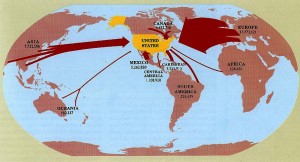
Supreme Court Decision on Immigration
Last week the Supreme Court delivered a split decision on Arizona’s 2010 immigration law, upholding the most controversial section of that law, “show me your papers” provision. The provision requires police officers to check the immigration status of all people stopped, detained, or arrested presumed there is “reasonable suspicion” to believe that the person is an undocumented immigrant. Reasonable suspicion can include objective factors but it also includes subjective factors, the person is nervous, doesn’t look the officer in the eyes. Despite people claiming the Supreme Court decision was a victory for immigration advocates, it wasn’t at all.
Attorney Cathy Albisa:
- My reaction is that we’re not having the right conversation.
- There was an involved technical decision regarding the federal government and the state government.
- The one thing that was lost except for a couple of lines, was the people at the heart of this problem.
- The people who’ve been displaced from their home countries through the global economy, and stripped of legal person hood, and now living in a constant state of fear. It’s a reflection of what a degraded state of politics we’re in.
- That if you pass a law that shocks the conscience, the fact that you got rid of some of it or most of it becomes a victory.
- The claims of victory are in themselves very troubling signs.
- Our expectations have become so low, that we consider it a step forward.
- At the heart of the law is an intent, to treat this group of people differently from other groups of people in the state of Arizona.
- What does that kind of racism do, what does that kind of living under constant threat do to a community, to a person and to a set of human rights, that we all should be defending?
- Immigration has always been a divide and conquer from the xenophobic side of the isle.
- If we assessed it that we live in a global economy, that rights cross borders. If people and capital can cross borders, protection can cross borders.
- Why are they here? If you look at the reason they cross borders, it’s economic.
- They’re displaced for economic reasons. We don’t look at the grinding poverty that displaces people as a rights question.
- The ones that want to hold are organizing and demanding their rights.
- www.nesri.org
- There are sheriffs across the country that object to these policies and refuse to implement these policies who say this does not keep our community safe.
- They (ICE) can literally create a life of ongoing terror for people, because they know they can be deported at any time.
Guest – Attorney Cathy Albisa, constitutional and human rights lawyer with a background on the right to health. Ms. Albisa also has significant experience working in partnership with community organizers in the use of human rights standards to strengthen advocacy in the United States. She co-founded NESRI along with Sharda Sekaran and Liz Sullivan in order to build legitimacy for human rights in general, and economic and social rights in particular, in the United States. She is committed to a community-centered and participatory human rights approach that is locally anchored, but universal and global in its vision. Ms. Albisa clerked for the Honorable Mitchell Cohen in the District of New Jersey. She received a BA from the University of Miami and is a graduate of Columbia Law School
————–


RFID: Microchips and US Soldiers / Search Engine Privacy
Today we get an update on the extent to which RFID technology is intruding in our daily lives. As many listeners may know, RFID stands for Radio Frequency Identification. In past shows we’ve discussed how big companies are embedding, or plan to embed, the so-called “Spychip” into clothes, credit cards, shoes and even into human flesh, all in the name of convenience, safety and commerce. The breach of civil liberties from spychip implantation is wide-reaching. Now, however, plans to develop implantable microchips for use in U.S. soldiers has taken a step forward. The U.S. military’s Defense Advanced Research Projects Agency, or DARPA, has confirmed plans to create nano-sensors to monitor the health of soldiers on battlefields.
Dr. Katherine Albrecht:
- What I discovered in 2003, some of the largest corporations, 500 of them had gotten together to come up with a plan to replace the barcode with tiny microchips hooked with tiny antennas.
- Now this initially was the brainchild of Proctor and Gamble to take the universal product code or the bar code and turn it into the EBC, the Electronic Bar Code. Their concept is that we would create, or the manufacturers and retailers of the world would create an internet of things.
- I was once going off to give a speech on RFID and I stopped and made an inventory of all the things I was wearing and carrying in their vision of the future, that would have an RFID tag. It was my shoes, the underwear, my stockings, my skirt, my purse, my briefcase, my notebook.
- Proctor and Gamble came up with an idea we detailed in our book to equip your refrigerator to the coming smart grid with RFID readers. They describe that – we would know when the consumer drank the last Pepsi and as if by magic ads on their TV would appear for Coke. The idea is that they would monitor what you’re eating.
- Monitor what you would run out of. There definitely are patents and plans, some of them creepier than others.
- I actually worked closely with the Associated Press to release the information that the microchip the implantable Verichip, you can take this microchip antenna and encapsulate in glass, and inject it into people.
- It’s the identical technology they put in to dogs and cats nowadays.
- There is a company that keeps changing its name – Verichip / Applied Digital Solutions / Digital Angel /
- They are trying to market this product for use in human beings. We did a 6 month investigation that revealed that these implantable microchips were causing cancer.
- We’ve got communities all around the country that have been mandated the use of microchips in dogs. There have been a number of dogs that have died from the microchip causing a cancerous tumor.
- ChipMeNot.com
- Privacy is not an ends. It’s a means. Privacy is a way of you maintaining control over your own information.
- Don’t put anything on facebook that you wouldn’t want put up on a billboard in Times Square.
- Where I get concerned is places where your privacy is invaded, that you don’t know what’s happening and you don’t have control over it.
- That’s not facebook, that’s getting in to Google.
- When you log on to Google, you think you’re logging on to a search engine that’s a helpful tool that’s going answer a question that you have.
- Google doesn’t view the google.com search box as a helpful tool for you.
- They’re not your Mom, they’re not your Dad, Google is a company that is in business to make money.
- The reality is if they came at us with guns and tanks, and laws and regulations forcing us to do that, we’d all say heck no,
- When Google gives us a little window that we type in what’s in our minds, we voluntarily do it and we thank them for it.
- Google is a multi-billion dollar corporation. When is the last time a multi-billion dollar corporation gave you all of its products for free? The answer is never, because those aren’t products they’re bait. You are the product.
- Every Gmail that you receive is read and copied and keywords are placed into the profile from both the sender and the recipient of every email. You’re not doing anything wrong but you certainly don’t that information out there in a giant database.
- If you’re using a Gmail account, if your client is using a Gmail account, and you don’t. If you are transmitting sensitive information I believe you’re not only in violation of attorney-client privileges but potentially even violation of the law.
- In exchange for that (free email service) you are allowing them to copy everything that you send.
- We recently ran across a (DARPA) proposal, a request for contractors to develop a system to inject micro-nano- chips into the bloodstream of soldiers that would allow them to remotely monitor the physiological processes of the soldier. Websites.
Guest – Dr. Katherine Albrecht, who along with Liz McIntyre authored “Spychips: How Major Corporations and Government Plan to Track your Every Move with RFID. We talk about DARPA and microchips and we’ll also get a preview about Katherine Albrecht’s research into exposing how Google email is a threat to privacy between attorney / client correspondence. www.startpage.com
————————————————————–
Civil Liberties, Criminalizing Dissent, FBI Intrusion, Habeas Corpus, Human Rights, Prosecution of the Bush Administration, Targeting Muslims, Torture, Truth to Power, War Resister
Podcast: Play in new window | Download
Updates:
—–


Lawyers You’ll Like: Attorney Nancy Hollander
In this week’s Lawyers You’ll Like series, we’re joined by attorney Nancy Hollander. Nancy has been a member and partner with Freedman Boyd Hollander Goldberg Ives & Duncan P.A. since the early 80s. Her practice is devoted to mostly criminal cases including those involved with national security. Ms. Hollander has also argued and won a religious freedom case in the US Supreme Court. She’s served as a consultant to the defense in a high profile terrorism case in Ireland – and she represents 2 prisoners at Guantanamo Bay Naval Base.
Attorney Nancy Hollander:
- I was a community organizer with JOIN, Jobs or income now.
- We organized Appalachian migrants to Chicago. I wrote a book that I co-authored with Todd Gitlin called Uptown.
- I became a photographer, I learned how to develop film in the basement of Jessie Jackson’s church. I was in Cleveland for a time and then came to New Mexico, became the Executive Director of the New Mexico Civil Liberties Union, then went to law school.
- I worked as a riveter in a football equipment factory.
- It looked like that whole began when I met with Vietnamese women in Indonesia 1964. I met with women from North and South Vietnam.
- We all met at the embassy, and I thought, that was odd meeting, and that was the beginning of my CIA file.
- I represent 2 people (in Guantanamo Prison) one is Mohamado Ould Slahi, he’s a Mauratanian citizen, he was there from almost the beginning.
- We won his habeas case, the judge ordered him almost immediately released.
- After ten years, the government said they didn’t have the preponderance of evidence to keep him.
- The government appealed, the case got remanded, and we’re essentially starting over.
- They changed what they accused him of continuously. He’s never been tried, he was tortured.
- The rule of law has become the law of changing rules.
- I got a security clearance and learned about SEPA and OFAC, the Office Of Foreign Asset Controls.
- We originally represented the Holy Land Foundation in its fight against the designated and some other civil litigation.
- They were charged and convicted of providing charity.
- The law is very fluid and lawyers have a lot of power. Our power is to make change and to create miracles in some cases. There have been something like 100 terrorism cases tried in New York alone since 9/11
Guest – Attorney Nancy Hollander has been a member of the firm Freedman Boyd Hollander Goldberg Ives & Duncan, P.A. since 1980 and a partner since 1983. Her practice is largely devoted to criminal cases, including those involving national security issues. She has also been counsel in numerous civil cases, forfeitures and administrative hearings, and has argued and won a case involving religious freedom in the United States Supreme Court. (see decision) Ms. Hollander also served as a consultant to the defense in a high profile terrorism case in Ireland, has assisted counsel in other international cases and represents two prisoners at Guantanamo Bay Naval Base. Nancy is co-author of WestGroup’s Everytrial Criminal Defense Resource Book, Wharton’s Criminal Evidence, 15th Edition, and Wharton’s Criminal Procedure, 14th Edition. She has appeared on national television programs as PBS Now, Burden of Proof, the Today Show, Oprah Winfrey, CourtTV, and the MacNeill/Lehrer News Hour.
—–
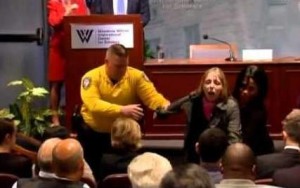
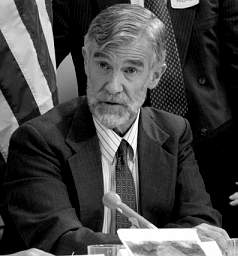
The Moral Challenge of ‘Kill Lists’ by Ray McGovern
The Obama Administration has conducted hundreds of drone strikes in several countries, killing civilians and a US citizen. Critics point out that as the Obama Administration assassinates its’ suspects, it also avoids the legal complications of detention. In last week’s New York Times, authors Jo Becker and Scott Shane expose the priest-like role of counter terrorist adviser John Brennan as he provides Mr. Obama with the moral justification for extrajudicial murder. The framing of John Brennan’s role of priestly adviser caught Ray McGovern’s attention. His recent article The Moral Challenge of Kill Lists, dissects the New York Times story.
Ray McGovern:
- There has been a geometric increase in the number of drone strikes against Pakistan and of course Somalia and Yemen.
- London based bureau for investigative journalism estimates that about 830 civilians including women and children may have been killed by drone attacks in Pakistan. 138 in Yemen, and 57 in Somalia. It’s incredibly naive to think that this helps in any way in the war on terrorism.
- This wonderfully insightful and dangerous New York Times article a week ago talked about the conundrum of aligning these activities with US legal and moral principles. Conundrum? That’s an impossibility.
- The Fifth Amendment prevents this sort of thing if you take the interpretation we’ve always had.
- As the New York Times article mentions 1 out of 30 assassinations that are known about just one escaped assassination and was brought before a court. It’s much easier to kill them.
- If you wanted to learn about al-Qaeda, don’t you think Osama Bin Laden could’ve told us some stuff about al-Qaeda?
- Any military aged male in the area of a “bad guy” is fair game.
- Maybe I can draw from my own experience in the CIA, I know about lists. I know that when there was a coup attempt in Indonesia in 1965, that there were lists given to the Indonesian authorities of communists. How many communists on that list? A million. How many were killed, were murdered? 500 thousand plus. How many were put in prison? The other 500 thousand.
- The drones are really accurate but the target information is notoriously inaccurate.
- I love Fordham and I hate to see the administration and the very wealthy trustees who have lots of money to give to Fordham, determine who comes in to give the commencement address.
- I think that you have to have some kind of personal involvement with innocent suffering. I think that you have to have some sense of the injustice others suffer to let your heart be touched by this direct experience.
- Obama’s fallen in with a rough crowd.
- I was attracted to getting outside of my Catholic walls. There’s a small church down in Washington DC called the Church of the Savior.
- I found out they were doing wonderful things like preventing housing from being gentrified so poor people can still live there. Healthcare, jobs, addictions, a hospice for people to sick to be on the street.
- There’s been one major change for the good in this country. That is Occupy.
- When you look for proof that Occupy has incredible potential, look no farther than what the president and the top senators thought necessary to inject into the NDAA on New Year’s Eve, which allows them to use the US Army of all things to wrap us all up without charge, without court proceedings.
Guest – Raymond L. McGovern, retired CIA officer turned political activist. McGovern was a Federal employee under seven U.S. presidents in the past 27 years. Ray’s opinion pieces have appeared in many leading newspapers here and abroad. His website writings are posted first on consortiumnews.com, and are usually carried on other websites as well. He has debated at the Oxford Forum and appeared on Charlie Rose, The Newshour, CNN, and numerous other TV & radio programs and documentaries. Ray has lectured to a wide variety of audiences here and abroad. Ray studied theology and philosophy (as well as his major, Russian) at Fordham University, from which he holds two degrees. He also holds a Certificate in Theological Studies from Georgetown University. A Catholic, Mr. McGovern has been worshipping for over a decade with the ecumenical Church of the Saviour and teaching at its Servant Leadership School. He was co-director of the school from 1998 to 2004. Ray came from his native New York to Washington in the early Sixties as an Army infantry/intelligence officer and then served as a CIA analyst from the administration of John F. Kennedy to that of George H. W. Bush. Ray’s duties included chairing National Intelligence Estimates and preparing the President’s Daily Brief, which he briefed one-on-one to President Ronald Reagan’s most senior national security advisers from 1981 to 1985.
—————————————————————————–
CIA Sponsored Terror, Civil Liberties, Criminalizing Dissent, FBI Intrusion, Human Rights, Political Prisoner, Prison Industry, Surveillance, Truth to Power
Podcast: Play in new window | Download
Updates:
——
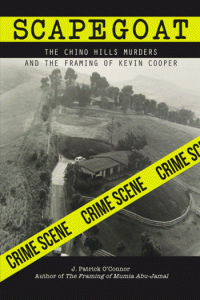
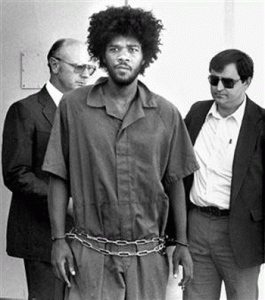
Scapegoat: The Chino Hills Murders and The Framing of Kevin Cooper
Scapegoat: The Chino Hills Murders and The Framing of Kevin Cooper is the title of Patrick O’Connor’s new book. This is an important document chronicling Kevin Cooper’s controversial conviction and death sentence in 1985. When O’Connor committed to writing the book, he poured over thousands of case documents from trial transcripts, grisly autopsy photos, appeals and judicial rulings. He then began interviewing those involved in the trial and appeals. The picture began to take shape, a familiar one. The prosecution and the police withheld and destroyed evidence that would have exonerated Kevin Cooper from the brutal murders of the Ryen Family and their guest.
J. Patrick O’Connor:
- In 2008, the Mumia book that I wrote was coming out and I was in the San Francisco Bay area with (attorney) Jeff Mackler of the Mobilization to Free Mumia.
- We had about 15 venues that we went to all over the bay area. Invariably, supporters of Kevin Cooper would come to these events and afterwards would take me aside and say you got to write a book about Kevin Cooper.
- His case is a lot different than Mumia’s but there are a lot of similarities.
- Once I started reading the transcripts of this trial, I could see there were a lot of things wrong with this case.
- It took me about 2 and half years from the start to the publication of the book.
- There was a terrible, in Chino Hills, this is Arabian horse country. This family named the Ryens, they live on a hilltop house with a very big spread, about 15 Arabians. San Bernadino-45 miles east of Los Angeles.
- In this area, most of the people were either raising horses or grazing cattle. This family was a mom and dad and they were both chiropractors. 41 year old chiropractors, and they had a 10 year old daughter named Jessica and an 8 and a half year old son named Josh.
- A friend of Josh’s 11 year old Christopher Hughs, spent the night.
- Around midnight that night, the home was breached. The master bedroom. The family was assaulted with an axe, or a hatchet, I think 2 knives, and an ice pick.
- It was an incredible fight, these people didn’t stand in line and say I’m next.
- The father Doug was 6’1″ 190lbs, a former Marine, an MP in the Marines and could take care of himself. The mother 5’8″ very strong, she was the one that could train the horses, these enormous horses that she could control.
- Both of them kept loaded weapons in the bedroom. The idea that one perpetrator could use 4 weapons to perpetrate this attack is kind of fecitious on its face.
- What put Kevin Cooper in the crosshairs is 3 miles from Chino Hills is Chino which is home to the California Institute for Men, where every felon in Southern California is sent for classification.
- Cooper was sent there for 2 burglaries in LA. Escapes and holes up in Chino Hills for the next 2 days, in a house located 125 yards from the Ryen’s house.
- Josh who had survived, told the deputy sheriff through a hand squeeze method that it was 3 white men. They put out APBs for 3 white guys.
- When they discern Kevin Cooper’s prints are all over that hide out house, they discard that information and start planning evidence that would implicate Cooper and making big lies about stuff that would implicate him.
- He would have been the only African-American in the community.
- They contaminated the crime scene, there are 2 bathrooms in this house, the cops used one of the bathrooms that had blood in the sink.
- They don’t type the blood properly, they put blood from all different parts of the room in the same bag.
- So, there’s no way to track the motions of who died, what was the order of death?
- They took the walls out, they carted out all the furniture, put it on the front yard. Then they moved it to a warehouse where the air conditioner broke. It went to 120 degrees, they lose all the blood evidence in the warehouse.
- The night of the murders, Cooper left after 9pm to hitchhike to Mexico. Cooper sees his mugshot on TV, he goes on the lamb. Cooper is got and convicted, he gets the gas chamber.
- He came with 3 hours and 45 minutes of being executed because of a moratorium. Kevin Cooper is fifth in line, this moratorium will end in 2013.
- They had to have the complicity of numerous people inside the sheriff’s department and a very willing DA’s office to perpetrate this fraud on Cooper.
Guest – J.Patrick O’Connor, editor of Crimemagazine.com and the author of The Framing of Mumia Abu-Jamal (2008). He has previously worked as a reporter for UPI, editor of Cincinnati Magazine, associate editor of TV Guide, and editor and publisher of the Kansas City New Times.
——–
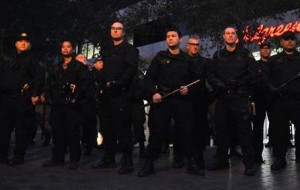

Homeland Security Documents Show Massive Nationwide Monitoring of Occupy Movement
Last month we gave Mara Verheyden-Hilliard and Carl Messinio of the Partnership for Civil Justice the Law and Disorder Tip Of The Hat Award for creative use of FOIA. The documents obtained by the Department of Homeland Security show a massive nationwide monitoring, surveillance and information sharing between DHS and local authorities. But its only the tip of the iceberg. The documents are heavily redacted and don’t show the full scale of coordination. “These documents show not only intense government monitoring and coordination in response to the Occupy Movement, but reveal a glimpse into the interior of a vast, tentacled, national intelligence and domestic spying network that the U.S. government operates against its own people,” says Mara Verheyden-Hilliard, she’s the Executive Director of the PCJF.
Attorney Mara Verheyden-Hilliard:
- We filed a series of FOIA requests and demands in November of last year when it was clear the Occupy movement was being subjected to a coordinated assault.
- We wanted to expose and uncover the role of the federal government working hand in hand with local police and municipalities to shut down this movement. A movement that is inspiring people all over the country and is a force for social change.
- What we have is the tip of a very carefully submerged iceberg.
- What we’ve seen is massive surveillance, coordination, monitoring of peaceful protesters all over the country by the federal government.
- There is monitoring that’s gone on from Washington DC, to Atlanta, to Detroit, to Dallas, that there is an intense focus going all the way up to high ranking members of the administration.
- We know that with the creation of the fusion centers and the suspicious reporting activity, the vertical integration of law enforcement and intelligence operatives in the US, that coming from a federal level, from the Department of Homeland Security, with billions of dollars. There is in place where all of the hundreds and thousands of law enforcement officers . . local is almost deputized, where they’re collecting information and feeding data.
- It’s critical that the people of the United States see this. The way for this to be stopped is to uncover it and expose it. We see time and again the FBI creating its own terrorist plots, in many times as PR to justify their oppressive apparatus.
- One of the defining features of the Obama Administration is the fact that it took on this apparatus put in place by the Bush Administration and not only didn’t take it apart, they have deepened it.
- There is really a structure now in the United States that has the US government spying and collecting data on its own citizens.
- We have regulation that has been put into place under the Obama Administration where there is growing use of military support for domestic civilian authorities which is very concerning.
- We can see that the real spark for social change is people getting together for collective action.
- What we want to accomplish is to keep the streets, sidewalks and parkland open for grassroots democracy and social change and people need the ability to come out and come together and in order to do that without fear that they’re going to be beaten . . or mass arrested.
- National Special Security Events: The Secret Service and Federal Government becomes the lead coordinating arm and local police work under that umbrella. In Tampa and Charlotte you can see they’re enacting these very repressive ordinances that facially look unconstitutional.
- The ordinances are trying to stop people from doing things are permitted, that are lawful.
- There is growing effort to take public space out from under our feet and one way of doing that is to say that there’s going to be an effort to restore the grass, and we fought this battle back in 2004 at the RNC in New York when we came to challenge the effort of New York City to ban mass assembly on the Great Lawn of Central Park.
- A lot of this effort is to make people feel alone and suffer in silence.
Guest – Mara Verheyden-Hilliard, co-chair of the Guild’s national Mass Defense Committee. Co-founder of the Partnership for Civil Justice Fund in Washington, DC, she recently secured $13.7 million for about 700 of the 2000 IMF/World Bank protesters in Becker, et al. v. District of Columbia, et al., while also winning pledges from the District to improve police training about First Amendment issues. She won $8.25 million for approximately 400 class members in Barham, et al. v. Ramsey, et al. (alleging false arrest at the 2002 IMF/World Bank protests). She served as lead counsel in Mills, et al v. District of Columbia (obtaining a ruling that D.C.’s seizure and interrogation police checkpoint program was unconstitutional); in Bolger, et al. v. District of Columbia (involving targeting of political activists and false arrest by law enforcement based on political affiliation); and in National Council of Arab Americans, et al. v. City of New York, et al. (successfully challenging the city’s efforts to discriminatorily restrict mass assembly in Central Park’s Great Lawn stemming from the 2004 RNC protests.)
———————————————————————
CIA Sponsored Terror, Civil Liberties, FBI Intrusion, Habeas Corpus, Human Rights, Surveillance, Targeting Muslims, Torture, Truth to Power, War Resister
Podcast: Play in new window | Download
Updates:
- Michael Smith and Heidi Boghosian Discuss May Day Events
- Michael Smith Reads A May Day Letter From Lynne Stewart
- Retired Chemistry Professor Tried For Jury Tampering Represents Self and Wins.
- Federal Lawsuit Filed Against NYPD For Improper Use Of Barricades
- Four City Council Members File Suit Against NYPD For Police Abuse
—–
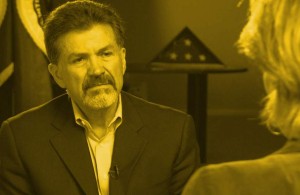
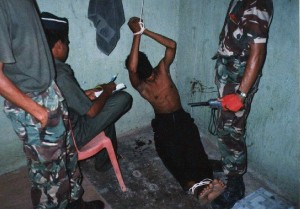
Former Head of CIA Clandestine Service Justifies Torture On CBS 60 Minutes
In a recent interview on CBS news, former head of the CIA’s clandestine service Jose Rodriguez discussed the destruction of 92 tapes in which terrorism suspects were subjected to water boarding and other forms of torture. Rodriguez told CBS that he destroyed the tapes to protect the people who worked for him at various black sites. But critics say Rodriguez is afraid of criminal prosecution because those 92 tapes contained compelling evidence of criminality and are a threat to Rodriguez and those who approved the use of torture. Rodriguez, a thirty-year veteran of the CIA, and spent most of his entire career in Latin America, supports the idea that torture works to get information.
Attorney Scott Horton:
- We know the government in response to FOIA requests, and litigation requests has released photographs and tapes repeatedly in the past, and always obliterates the faces involved, so of course the identities are not released.
- Obama announced in his speech from Kabul, al-Qaeda’s been defeated. It’s a faint shadow of what it was before.
- The tapes contained evidence of crimes, it showed water boarding and other torture techniques. It documented those techniques, and that presented a risk to Jose Rodriguez and to the the people up above Rodriguez who are responsible for putting through torture policy.
- George Tenet was involved, Bybee, a judge in the Ninth Circuit in Las Vegas, John Yoo who is a professor at the University of California, Steven Bradbury who is now a partner in a law firm in Washington DC and then it went into the White House where it went into the National Security Council.
- The trail consistently leads straight into the office of former Vice President Dick Cheney. He was the key mover for the introduction of torture policy.
- Domestically, we have an anti-torture statute that includes for conspiracy to torture, both of those things were violated. They apply outside of the United States, so they would have applied to the conduct of a CIA agent operating in Poland or Thailand for instance.
- Jose Rodriguez: He’s trying to make money, he’s selling a book, what you saw was a 36 minute advertisement for his book, published by an affiliate of CBS.
- Beyond that I’d say he’s trying to build sympathy and beat back calls for his own prosecution.
- I think this was an ill advised strategy and I think he confessed to criminal conduct in the course of this interview.
- At one point they claimed that they were able to track down and pick up Jose Padilla through the use of water boarding, which is very very interesting because Padilla was arrested and in custody before the first case of water boarding was applied.
- Mitt Romney has been out there punching away constantly on the advocacy of torture and the response from the Obama campaign has been silence. Silence.
- The guy came across to me as something of a psychopath (Jose Rodriguez)
Guest – New York attorney Scott Horton, Scott is known for his work in human rights law and the law of armed conflict. Scott is also the contributing editor to Harper’s Magazine.
—–
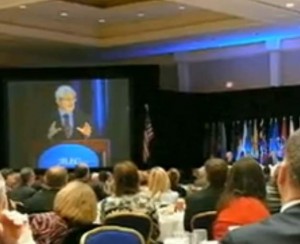
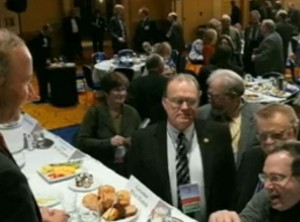
Common Cause Files IRS Whistleblower Complaint Against ALEC
The American Legislative Exchange Council, or ALEC, is a tax exempt charity that spends millions of dollars annually to lobby for hundreds of bills in state legislatures around the United States. It came to the attention of the public for having drafted and pressured passage of the so-called stand your ground legislation after the shooting death of Trayvon Martin in February. The watchdog group Common Cause has asked the IRS to review ALEC’s status claiming that ALEC is “a corporate lobby masquerading as a charity,” and that contributors should not be allowed to claim the gifts as charitable contributions.
Nick Surgey:
- ALEC describes itself as nonpartisan although the majority are members of the Republican Party.
- It’s concerning from a tax perspective, ALEC is operating as 501c non-profit, which means its a charity.
- Therefore corporations who are members of ALEC are allowed to take a tax deduction, when they contribute up to hundreds of thousands of dollars.
- If Visa, Verizon or Amazon then those lobbying would not be tax deductible, they would be subject to tax, but they do the same lobbying through ALEC.
- All of those contributions are subsidized by us – the tax payer. And that’s wrong.
- We shouldn’t be subsidizing the activities of any corporation.
- Until recently ALEC operated 9 Task Forces, they were forced to close one 2 weeks ago.
- Stand Your Ground Bill / Drafted by the NRA, lobbied by them and presented to legislators in Florida 2005.
- The NRA took it to ALEC, who they’re a member of, Walmart chaired the taskforce. Walmart the largest retailer of weapons in the United States.
- The Stand Your Ground bill is now law in 20 states.
- ALEC organizes around these 9 task forces. They have bills that really cover almost every policy area.
- Other areas include rolling back environmental protection, they have a commerce task force, where a lot of anti-union bills, the right to work legislation, it comes from that task force.
- Corporations will use the state essentially to lobby on their behalf.
- Common Cause has a very good picture of what ALEC has been doing in the last 2 years and this formed the basis of this massive IRS submission.
- One document are these scorecards which they send to their corporate members, where they celebrate the success that they have. Some of the early scorecards, they mapped out the complete picture of the United States and where all of their model bills have been introduced.
- A source provided us with emails going between ALEC and state legislators. We were very greatful to be represented pro-bono by one of the country’s leading whistle-blower firms, Phillips and Cohen.
- Voter ID has been increasingly connected to ALEC.
- We believe the bigger fraud is disenfranchising millions of predominantly African American, elderly or young student voters. In wasn’t until 2009 when ALEC took it up, that it really injected energy into it at the state level and its been introduced in 34 states. (Voter ID)
- ALEC has an ability to take a law, not always a new law and sell it to their almost 2000 state legislator members.
- ALEC has about a third of all state legislators in the entire country as members.
- There was a fracking bill, and it was sponsored by Exxon Mobile.
- ALECExposed.org
Guest – Nick Surgey, Nick conducted the research helping to expose the American Legislative Exchange Council. Nick joined Common Cause in March 2011 as a Legal Associate. He formerly worked at the British Refugee Council in Leeds, England, where he advocated on behalf of asylum seekers. He previously worked at an immigration law firm, as an elected student union officer and as a paid campaigner. Nick holds an undergraduate degree in History and Politics and a post-graduate diploma in law.
—————————————–






















